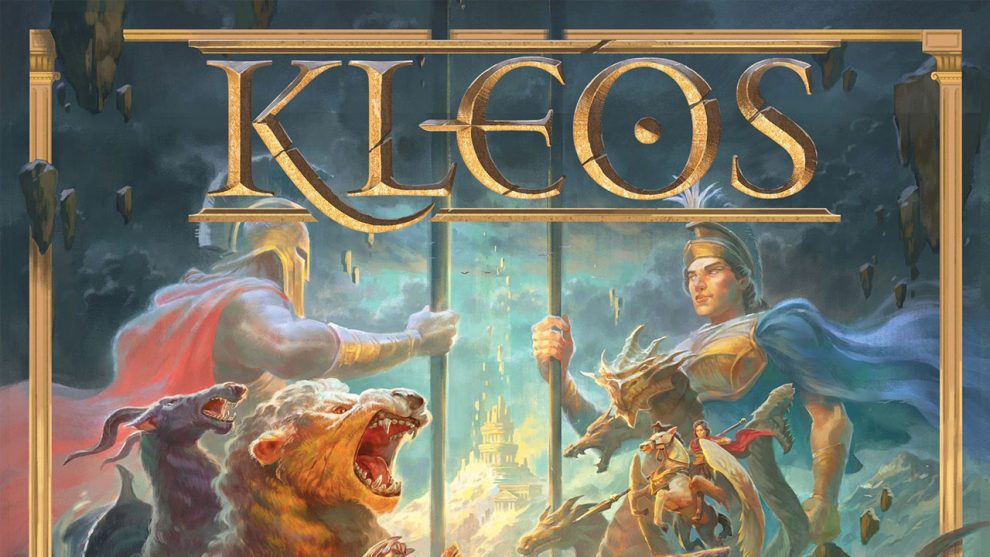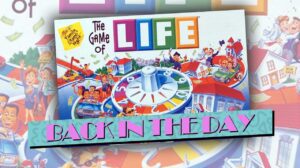Disclosure: Meeple Mountain received a free copy of this product in exchange for an honest, unbiased review. This review is not intended to be an endorsement.
There comes a time in every man’s life when he has to embrace his fate.
While I was standing at PAX Unplugged last December, I watched the demo of a game designed by Jim Kavanaugh and published under his label Azure Horizon Games. Everything I witnessed landed for me, gameplay-wise: some theme, but not a bunch. Variable player powers. Dice; lots of dice. Player boards, minis, gods, cards, and combat on a map so small there’s no room for anything but combat.
“What is this?” I asked Jim. He began to answer, but his voice was gone. Thankfully, Jim’s wife was doing double duty on this fine Saturday afternoon: booth attendant and marketing specialist.
“It’s Kleos,” she began. “Jim does a better job of explaining the game, but you should try it! You’ll like it!”
I hadn’t even played it, but I knew I needed a review copy to find out more. Kleos does a lot of things right, but ultimately it succumbs to the pressure of dice rolls; two-thirds of the time, you are going to fail, and it feels like the odds are even worse than that.
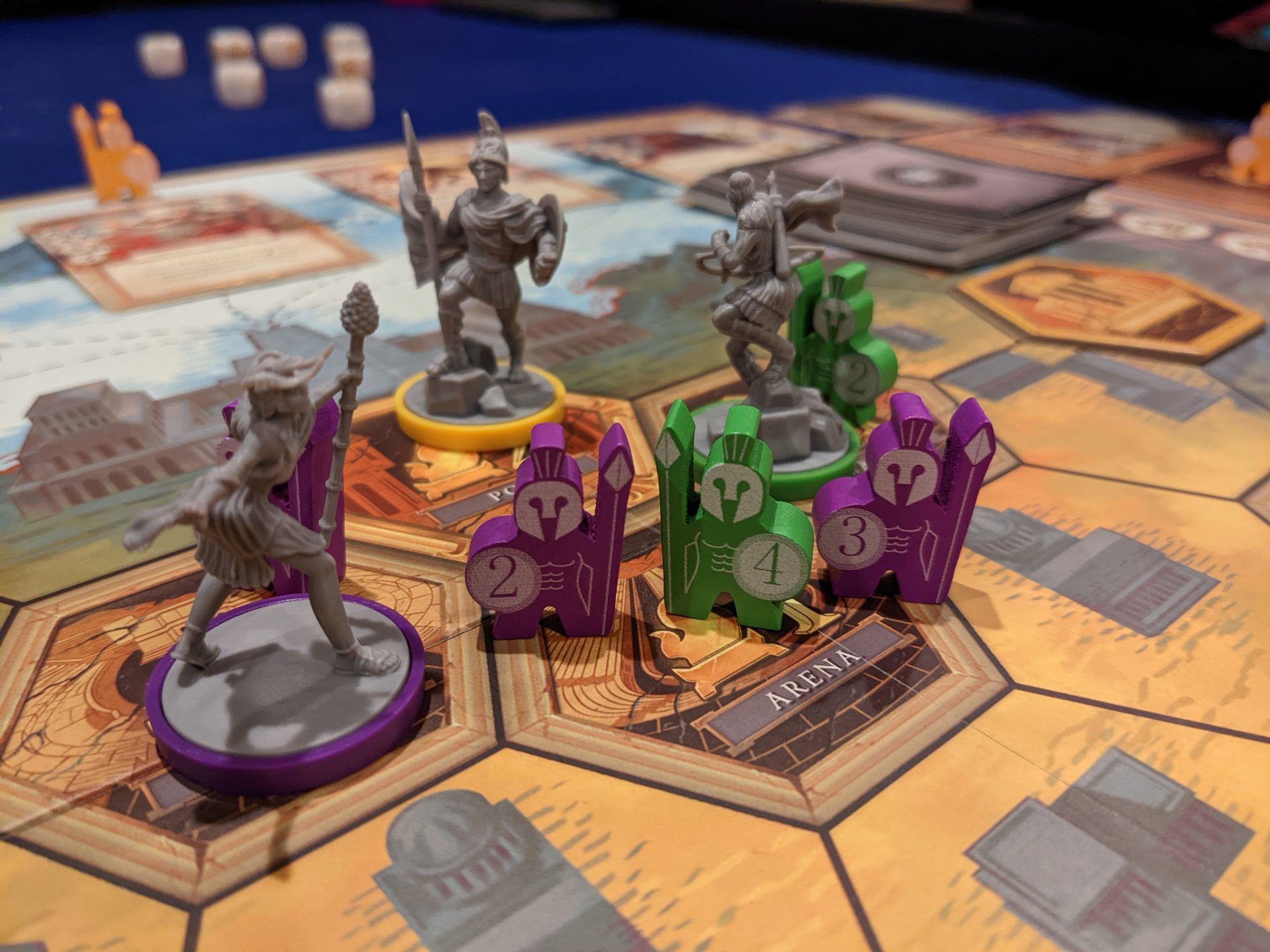
Take That, Take That
Kleos is firmly in the realm of “take that” gameplay: the fastest way to score points is to defeat opposing Minions controlled by the gods of your opponents by attacking them every round. Therefore, this is not a game for everyone, especially many of my gaming collective who would prefer to build efficiency engines to outwit the competition.
Kleos is not an efficiency game; it’s a dice chucker, and it’s a hoot, albeit a slower, heavier downtime hoot than I expected.
The backstory: the gods are watching over Greece, enjoying their time upon Mount Olympus, when word arrives that mortals are building a new city-state, Kleos, said to rival the best of what city life has to offer, more so than even Troy or Athens. “Let’s run a contest,” Zeus says to his fellow gods. Whoever earns the most Glory over the course of five days (rounds) will become the patron god of Kleos.
Patron god, you say? Count me in. Time to get those hands dirty. Players will earn Glory (points) in two ways. First, via area control, where 4 of the hexes on the tiny, confrontational map score points for whoever controls them at the end of the round. Second, by recruiting and killing opposing player-controlled Minions off the map.
And that’s where the rubber hits the road in the game Kleos. As one of the Olympian Gods—Ares, Hermes, Dionysus, Athena or Artemis—you’ll have a mix of champions, Epic Minions, and lesser creatures under your control. You’ll march these Minions (everything you’ll be moving around the map in Kleos is a Minion) straight to the middle of the map to engage in combat by chucking dice and strategically using the powers of each of your Minions to your advantage.
The entire game can be taught from the player aid, a big plus in my book. You’ll get cards, then play cards to your player board (mostly Minions, occasionally extra powers in the form of blessings or curses, maybe even a ride from a Heroic Mount if your Minion is a Hero). Then, in player order, each of your Minions get 2 actions to move, attack, or recruit Epic Minions from the Greek Isles.
Occasionally, you’ll be able to draw cards from your unique Divine deck. The Divine deck leans into your god’s specialty and gives you some big advantages in key areas to defeat your opponents, make it easier to recruit, or provide bonuses if you fight in larger packs. Dionysus’s power: throwing wine at opposing Minions to slow them down, taking dice away from attack rolls at just the wrong times!
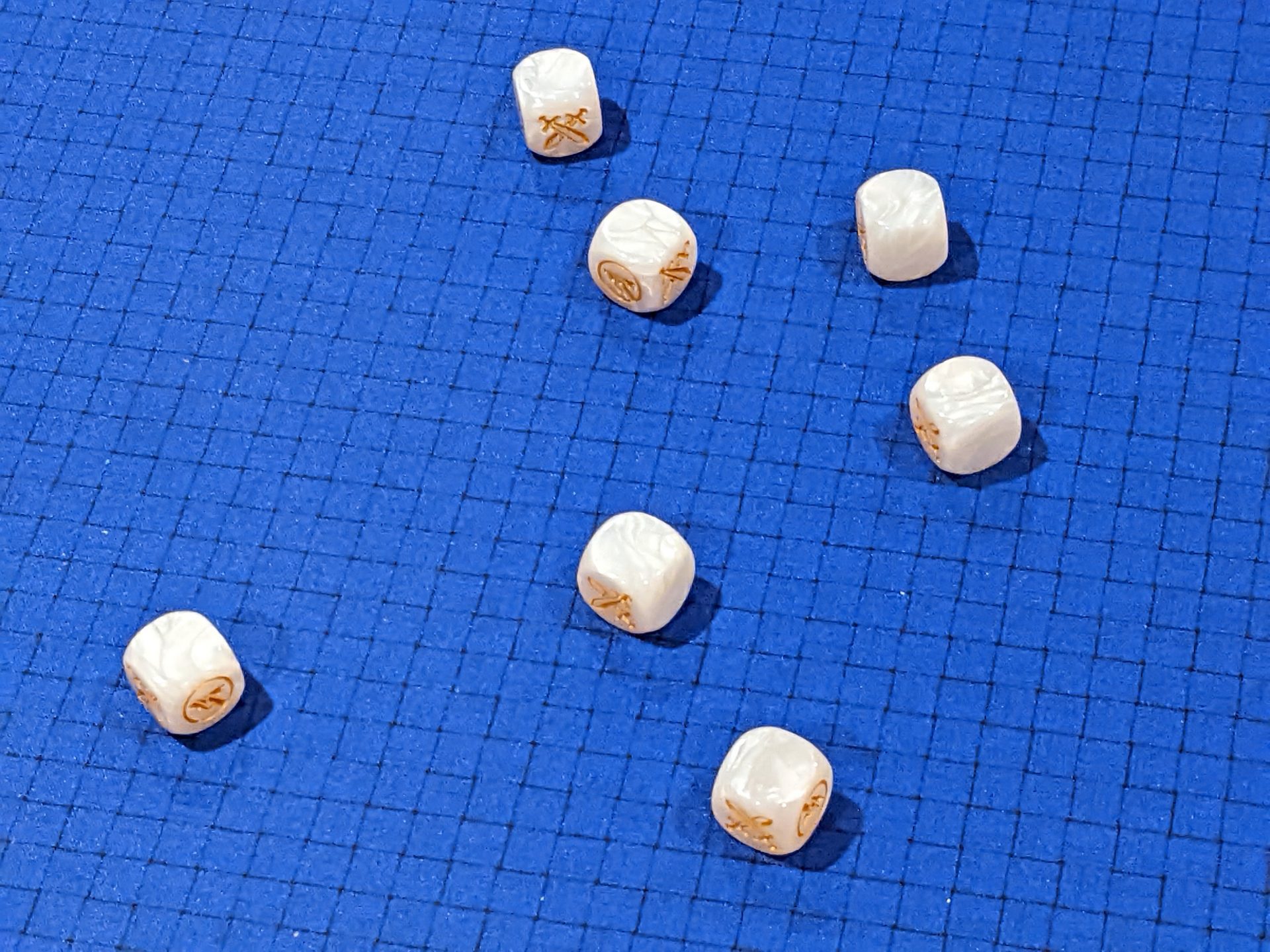
Let’s Talk About the Dice
All of the Minion cards in Kleos have 4 stats: Attack, Defense, Cunning, and Tactics. No matter the skill check, the deal is the same: the number in each box aligns with the number of dice you get to roll. Attack value of 7? Roll 7 dice. Tactics value of 2 on another Minion in your current location? Add that number of dice to your attack roll.
Here’s the thing: the 6-sided dice are blank on half the sides. Rolled blanks lead to a failed check. The other half? 2 successes, and one die face known as “Godly.” If you have Olympus’ Favor, or another power on a card, you’ll be able to count a Godly roll as a success. Otherwise, each die’s base odds are 66% failure, 33% success.
You are going to fail a lot in Kleos. Like, a LOT. Even knowing the odds, I was shocked how often my attacks came up empty. But everyone is rolling the same dice, so using your Minion’s powers becomes vital to winning in combat. Rolled successes equal to or greater than an enemy’s defense will kill them off, but unless you Slaughter that enemy with at least 3 more successes than the enemy’s defense rating, they will get a chance to retaliate.
Earning kills in Kleos is a highlight. Rolling just enough to Slaughter an opponent is especially satisfying, since you’ll earn an extra point of Glory if you are lucky enough to make that happen. Just be prepared to embrace failure, because I was surprised how many times I thought I had the tactical advantage and came up completely empty on my dice rolls.
These are Gods, Remember?
The cards in each player’s Divine deck are awesome. Sometimes, they are ridiculous.
Then it hits you: oh, yeah, these ARE gods from Olympus! They should be able to play cards that break the game!
And some of these cards are fantastic. Mind control to use another player to recruit Epic gods from the Greek Isles? Check. Adding the “Hunter” ability, which normally gives bonuses to characters who prefer to fight alone, to Minions who are actually NOT fighting alone? Another check. Instant kill cards? Also, check.
Kleos has a special deck, Zeus’ Favor, for any player losing by 5+ Glory at the beginning of a round, and those cards are even more ridiculous. Sure, it’s a one-time catch-up mechanism that gives that player a temporary advantage. And this means games of Kleos are often tight. My first game of Kleos ended with the winning player going last and snatching control of 2 of the 4 area control spaces to win 19-18-16 in our 3-player matchup.
The cards are sweet. They are also swingy, but over the course of a 5-round game I found this to mostly even out. What doesn’t even out is player count and player order; this is maybe the biggest red flag of the game, but there are plenty of other minor flags in a game one of my review crew team members called “interminable.”
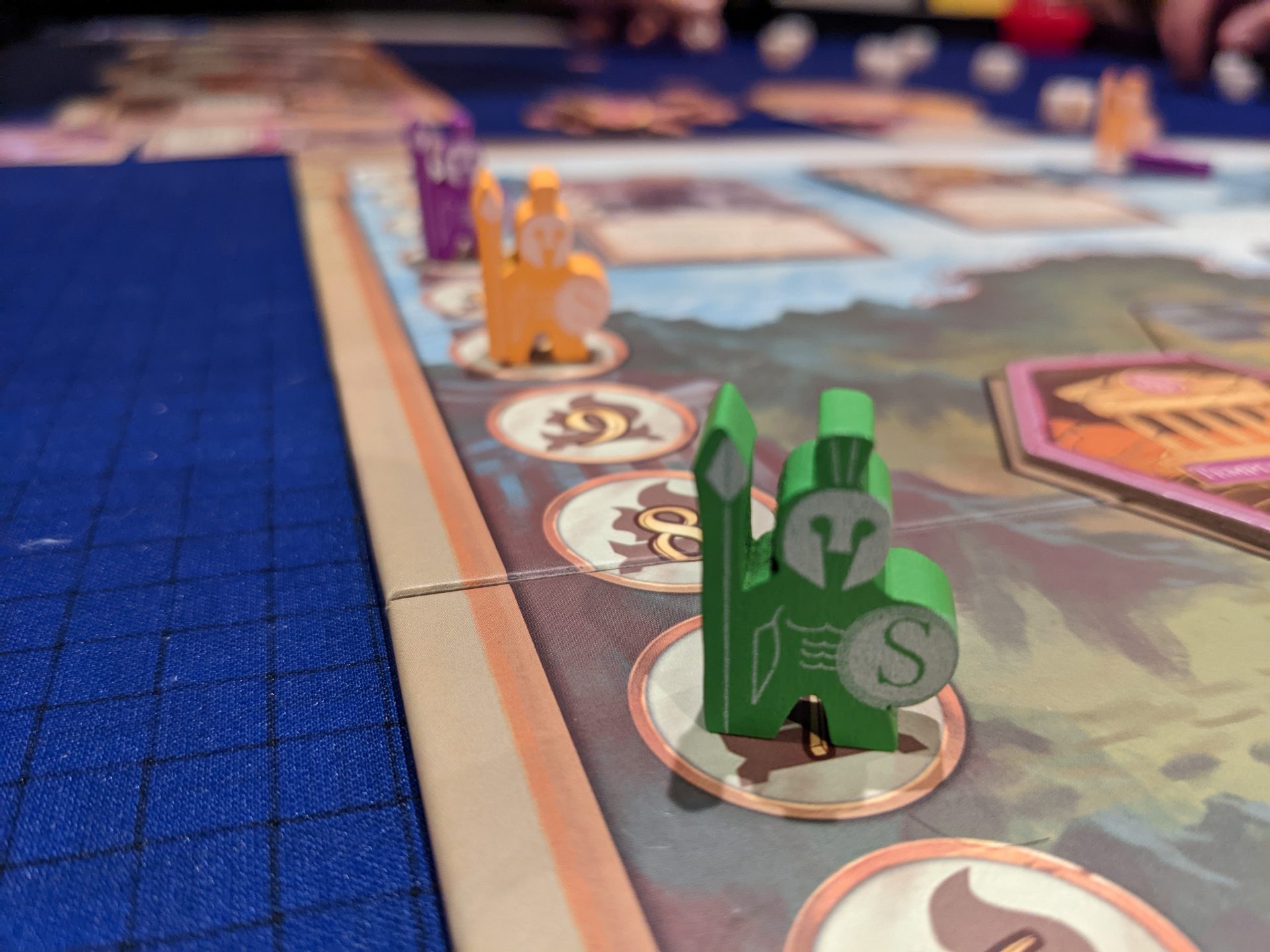
You Want to Go Last
Going last in player order in the 5th round of Kleos is absolutely a gamebreaker if you are in competition for the lead.
If you play your cards right—literally and figuratively—you may find yourself in the driver’s seat at the end of a game of Kleos. If you only need one point to win, and you have a way to control even one of the 4 area control locations, your final turn of the game is simple: take the hill. In a case like this, you don’t even have to roll the dice.
You might also find yourself in a position needing only a point or two, and the other players have slugged it out trying to control the middle of the map. Swooping in and knocking out opposing Minions with weakened numbers could be clutch, and because you’re the active player, they can’t do anything about it.
The consolation here? Retaliation could lead to another player killing off a player only needing to stay alive to win. Kleos features the “Opportunity Attack” format seen in many other games like this; when a player who moves a Minion out of a contested space will get attacked by opponents staying in that hex. So, there are a couple of ways to stay in the mix, but the final turn of the game can be very anticlimactic depending on the board state.
But multiple plays of Kleos revealed other issues. Downtime is the ominous, dark cloud hanging over the entire Action phase sequence in each round. You might have 15 minutes to wait between taking actions, although you might be able to stay busy by rolling for Retaliation checks in a round when being attacked. In a 5-player game where other players have a full count of 5 Minions, that means that if you are going last, there could be as many as 40 individual actions before your turn comes around again.
FORTY.
We had one of our review crew members bail last-minute for a night when I was set to play Kleos at 5 players, and I’m still thankful that he didn’t show up. Kleos at 5 players feels like both the most exciting way to go to war in the middle of the map, and the worst slog to sit through ever. Because a player does all of their actions before passing, you could be out of the fight for a while and watching people chuck dice this many times will wear you down.
Cycling through your Divine deck, the deck with all of your God-specific cards? Never happens. I’ve never seen more than 7 of these cards in a single game, and these are the best cards for each character. You might only see 5 of them all game, if you are only able to see one of them to start each round. That’s a shame, because that’s the reason you want those gamebreaking powers in the first place!
Other problems? We had a 4-player game where one player was the runaway leader. Kleos just isn’t built for a player to come back from a double-digit deficit in the final round, even with a couple of Zeus cards on hand. This is especially true when you can’t take enough actions to score or when you have to respawn all of the Minions you lost in a previous round to end the game.
Random card draw? Sure thing. This is quite an issue when you are hoping to draw Minions, to give you chances to fight or control area majorities, and you draw Blessing/Curse cards instead, or one-time event cards that don’t help in your current situation. I’m fine with this, because that’s the nature of something like a random card draw! But when you are hoping to get back into the fight, it makes the final 20-30 minutes of the game feel very empty.
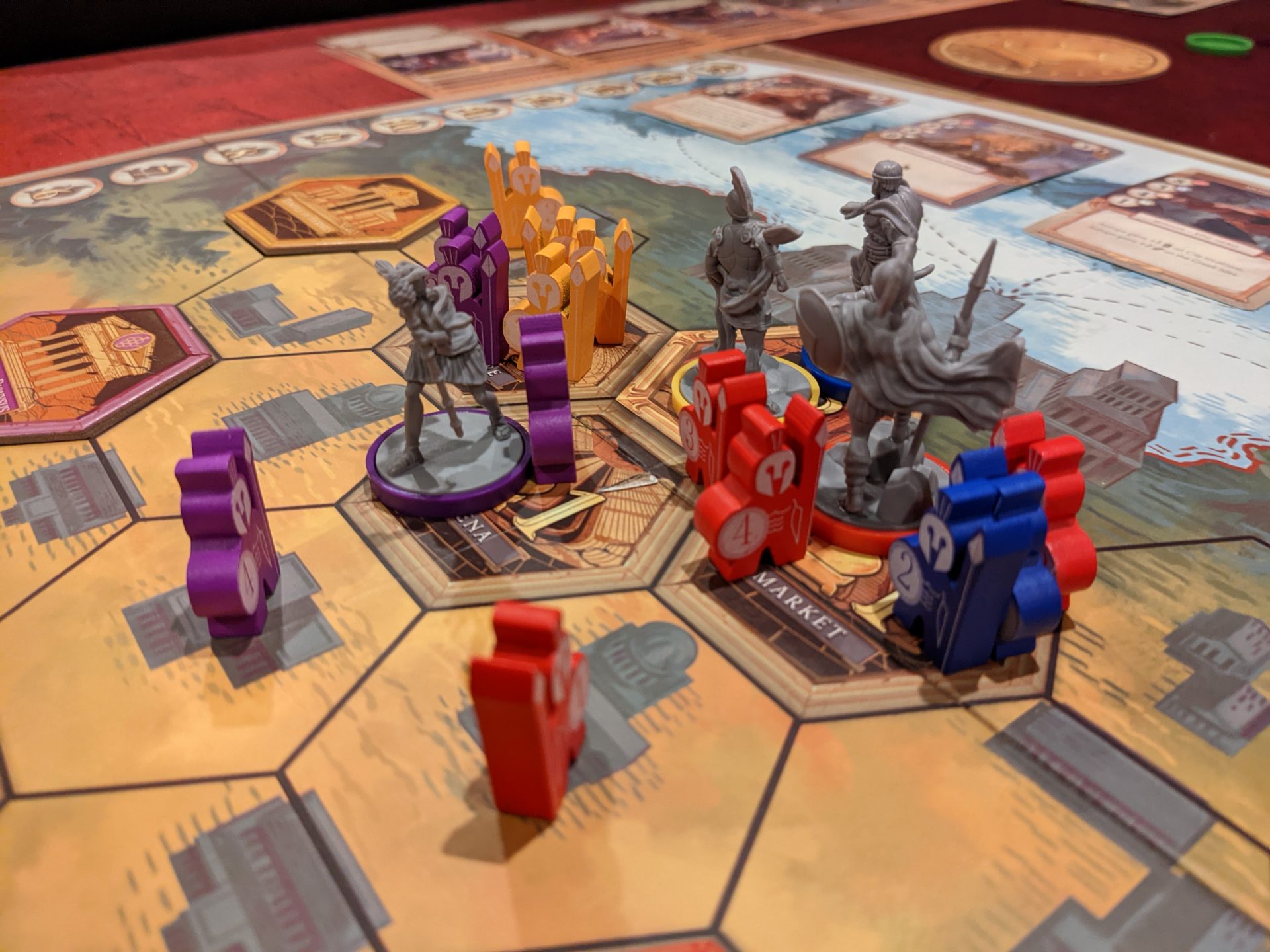
A Strong Maybe
I really enjoy Kleos as a 3-player game where you know coming in that you’ll be chucking dice, and luck plays heavily into the outcomes of combat. It’s interactive. It’s a nice production, with just enough of a story to get things rolling. The player aid and rulebook are excellent. The cards are relatively varied and will lead to a decent variation in tactical situations. The variable player powers and asymmetry in personal player decks are fun, assuming you get the chance to really explore them. There is a catch-up mechanic to ensure games stay close, as long as players can keep it close over the first 3 rounds. Plus, Kleos has options for solo players, although I prefer my combative dice chuckers with people around the table. The box has a great insert so unpacking the game is a breeze.
And, those dice feel good in the hands, even if you’ll come up empty the vast majority of the time, no matter how many dice you roll.
The downsides? Kleos could use a shake-up with the Fates deck, which has a decent number of repeat cards. The turn order issue at the end of games may or may not be a long-term issue but I’ve noticed it in my plays. Some people won’t like rolling dice that will statistically come up empty so often.
And here’s the strategy for every game I’ve seen so far: move to the center of the map, control the Port, and use that to either fight off opponents, or travel to the Greek Isles to recruit epic minions. Every game will take on the same look, and break along luck lines based on who’s rolling well; this is really critical in games where one player can get and hold Olympus’ Favor, which allows for “Godly” die results to count as successes. This is the best way to dominate/Slaughter foes and score double for kills.
I’m really surprised that the turn order issue wasn’t resolved in a better way. As it is, the game seems to almost require playing it at 5 players (there are 5 rounds in the game), because otherwise, at least one player will gain a major advantage by going last multiple rounds. This was especially blatant in 4-player games; one player will go last twice in a round, almost guaranteeing a chance at tactical advantages for area control. Fights throughout the round sometimes empty out certain scoring hexes, making it easier to stroll in uncontested at the end of each round.
The positives just barely outweigh the negatives, particularly at lower player counts. I love chucking dice and I love confrontational games; I hate downtime, and Kleos overstays its welcome by at least a full round every time. However, if you like your games served with a healthy dose of “Ameritrash,” give this a look; Kleos is a dice chucker through and through!


